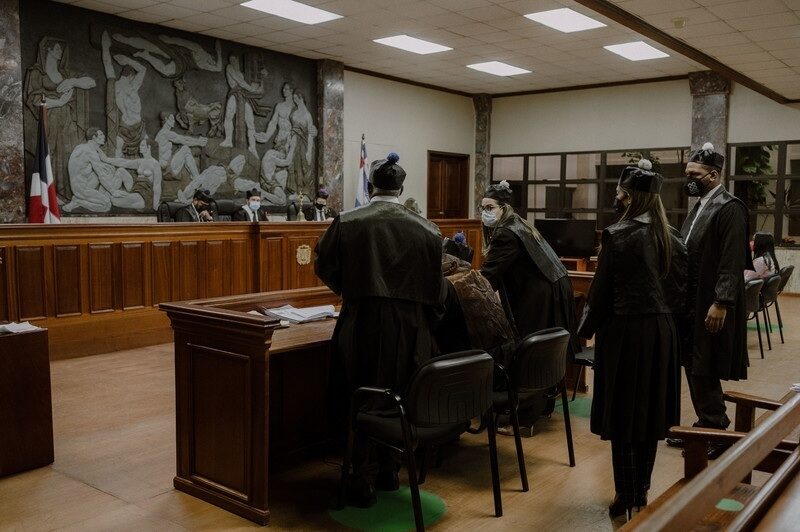For the first time, the National Attorneys General Training and Research Institute (NAGTRI), the training and research arm of the National Association of Attorneys General (NAAG), and International Justice Mission (IJM) are joining forces to train prosecutors and investigators from the Ibero-America region on case management and proper care for victims of violence against women and children, with a victim-centered approach.
During the month of April 2021, public servants will participate in weekly webinars where they will have access to information on the impact of trauma on victims of violence, and vicarious trauma to public servants. They will also receive practical tools to provide specialized and quality services to victims while maintaining the necessary emotional self-care.
Participants will have the opportunity to share their knowledge and experiences learned in their countries. The first two sessions will focus on trauma and its impact, not only on victims but also on public servants, while exploring theoretical concepts, tools, and practical experiences from some countries. The second two sessions will focus on abbreviated criminal proceedings that can help reduce or prevent the retraumatization of victims and thus help obtain prompt justice.
Rebeca Grynspan Mayufis, Secretary General of the Ibero-American Secretariat General, highlighted that "in recent decades, the region has made progress in ensuring women's rights. All Ibero-American countries have ratified the Convention on the Elimination of All Forms of Discrimination against Women.”[1] These advances demonstrate political will and progress within the region to defend and safeguard women's rights. However, violence against women and children remains alarming in the region.
A recent World Health Organization report estimates that, in 2019, one in four women in the Latin American and Caribbean region were victims of violence[2]. This figure does not yet include the numbers of domestic violence or violence against women during the COVID-19 pandemic, which has only exacerbated this dramatic reality. As Ibero-American communities work to rebuild from the effects of the pandemic, the responsiveness of public servants is essential to rebuilding safe communities.
The region has made progress in the creation and ratification of laws and public policies. However, ensuring that victims of violence accessing the judicial system are treated with dignity and warmth, avoiding retraumatization by those who enforce the law, remains a major challenge within the justice and public security services.
Survivors of violence may experience high levels of retraumatization during the investigation and prosecution of their cases, as they recount traumatic events in front of different actors such as judges, prosecutors, investigators, health workers, and/or forensic doctors. Adequate care and protection of victims not only guarantees their active participation, safety, and well-being during the investigation and prosecution, but also ensures that their testimony is not affected as an integral part of the investigation and prosecution.
“Silence is a powerful weapon that intensifies violence against women and children,” stated NAAG Executive Director Chris Toth. “This training will provide prosecutors and investigators additional tools and skills to support victims and fight against this scourge.”
Public servants in charge of investigating crimes also experience vicarious or secondary trauma. This type of trauma is very similar to post-traumatic stress and can lead to professional exhaustion syndrome, which can result in a lack of awareness of the issues being worked on, depression, or chronic fatigue.
“The emotional self-care of public servants is paramount to an effective response within the justice system. Ensuring their well-being reduces the risk of vicarious trauma, and ensures the best care for the victims they serve,” said Pablo Villeda Ortiz, Regional President of IJM Latin America.
The IJM and NAGTRI training will focus on creating a safe space for reflection, sharing experiences and practical tools among participants to improve care for victims and ensure self-care. Speakers will include the Attorney General from El Salvador, Raul Melera, magistrates, judges, prosecutors, and investigators who are experts in wellness and trauma.
***
About NAAG: The National Association of Attorneys General (NAAG) is the nonpartisan national forum for the 56 state and territory attorneys general and their staff. The National Attorneys General Training & Research Institute (NAGTRI), a NAAG branch, provides innovative legal trainings and comprehensive research to state and territory attorney general offices, as well as internationally, as a means to serve as conscious global stewards to address transnational crimes and challenges. NAGTRI’s international training assistance, offered through its Center for International Partnerships and Strategic Collaboration, has included developing training curricula and executing training and consultant assistance in capacity-building missions in Mexico, the Americas, Asia, Eastern Europe, and Africa. The assistance NAGTRI has offered varies broadly from a topical standpoint and has included, for instance, skills-based and train the trainer trainings on topics as diverse as oral and advocacy trial, public corruption, evidentiary foundations, human trafficking, gender violence, organized crime, officer-involved shootings, handling politically sensitive cases, and computer forensics for attorneys.
About IJM: International Justice Mission is a global organization that protects people in poverty from violence. IJM works with local authorities in 21 Programme Offices, in 14 countries, to combat slavery, violence against women and children and other forms of abuse against the most impoverished. IJM works to rescue and restore victims, hold perpetrators accountable, and help strengthen public justice systems. In Iberoamerica, IJM has programs in Bolivia, El Salvador, Guatemala, and the Dominican Republic.
[1] Gender equality in Latin America, available at https://www.eltiempo.com/vida/mujeres/igualdad-de-genero-en-iberoamerica-470014
[2] Violence against women 2021, available at Global and regional estimates of violence against women (who.int)
